高考复习形容词和副词
高中英语2024届高考复习核心形容词副词汇总(无聊厌倦+勇敢+笨拙+独自孤独)
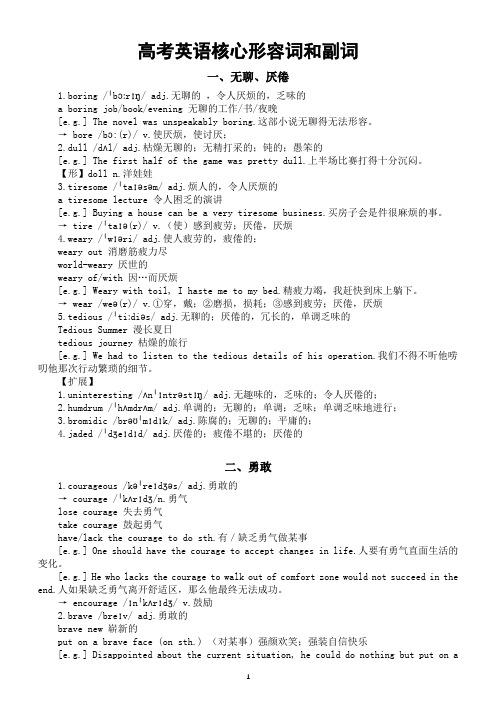
高考英语核心形容词和副词一、无聊、厌倦1.boring /ˈbɔːrɪŋ/ adj.无聊的,令人厌烦的,乏味的a boring job/book/evening 无聊的工作/书/夜晚[e.g.] The novel was unspeakably boring.这部小说无聊得无法形容。
→ bore /bɔ:(r)/ v.使厌烦,使讨厌;2.dull /dʌl/ adj.枯燥无聊的;无精打采的;钝的;愚笨的[e.g.] The first half of the game was pretty dull.上半场比赛打得十分沉闷。
【形】doll n.洋娃娃3.tiresome /ˈtaɪəsəm/ adj.烦人的,令人厌烦的a tiresome lecture 令人困乏的演讲[e.g.] Buying a house can be a very tiresome business.买房子会是件很麻烦的事。
→ tire /ˈtaɪə(r)/ v.(使)感到疲劳;厌倦,厌烦4.weary /ˈwɪəri/ adj.使人疲劳的,疲倦的;weary out 消磨筋疲力尽world-weary 厌世的weary of/with 因…而厌烦[e.g.] Weary with toil, I haste me to my bed.精疲力竭,我赶快到床上躺下。
→ wear /weə(r)/ v.①穿,戴;②磨损,损耗;③感到疲劳;厌倦,厌烦5.tedious /ˈtiːdiəs/ adj.无聊的;厌倦的,冗长的,单调乏味的Tedious Summer 漫长夏日tedious journey 枯燥的旅行[e.g.] We had to listen to the tedious details of his operation.我们不得不听他唠叨他那次行动繁琐的细节。
【扩展】1.uninteresting /ʌnˈɪntrəstɪŋ/ adj.无趣味的,乏味的;令人厌倦的;2.humdrum /ˈhʌmdrʌm/ adj.单调的;无聊的;单调;乏味;单调乏味地进行;3.bromidic /brəʊˈmɪdɪk/ adj.陈腐的;无聊的;平庸的;4.jaded /ˈdʒeɪdɪd/ adj.厌倦的;疲倦不堪的;厌倦的二、勇敢1.courageous /kəˈreɪdʒəs/ adj.勇敢的→ courage /ˈkʌrɪdʒ/n.勇气lose courage 失去勇气take courage 鼓起勇气have/lack the courage to do sth.有/缺乏勇气做某事[e.g.] One should have the courage to accept changes in life.人要有勇气直面生活的变化。
高考英语复习形容词和副词知识点讲解讲义(必考点)
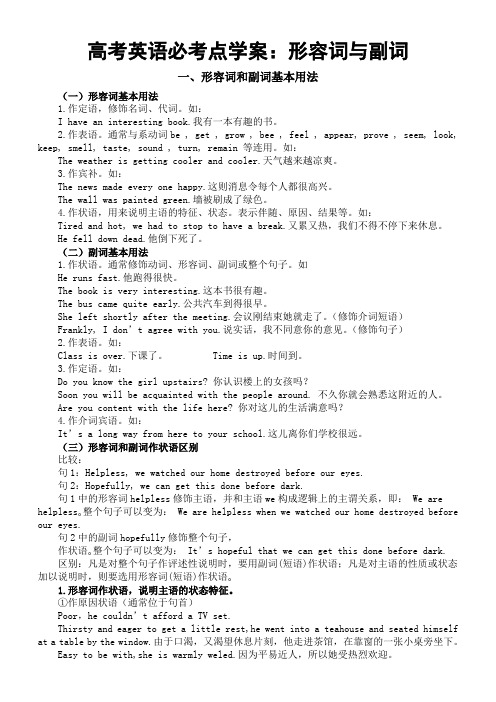
高考英语必考点学案:形容词与副词一、形容词和副词基本用法(一)形容词基本用法1.作定语,修饰名词、代词。
如:I have an interesting book.我有一本有趣的书。
2.作表语。
通常与系动词be , get , grow , bee , feel , appear, prove , seem, look, keep, smell, taste, sound , turn, remain 等连用。
如:The weather is getting cooler and cooler.天气越来越凉爽。
3.作宾补。
如:The news made every one happy.这则消息令每个人都很高兴。
The wall was painted green.墙被刷成了绿色。
4.作状语,用来说明主语的特征、状态。
表示伴随、原因、结果等。
如:Tired and hot, we had to stop to have a break.又累又热,我们不得不停下来休息。
He fell down dead.他倒下死了。
(二)副词基本用法1.作状语。
通常修饰动词、形容词、副词或整个句子。
如He runs fast.他跑得很快。
The book is very interesting.这本书很有趣。
The bus came quite early.公共汽车到得很早。
She left shortly after the meeting.会议刚结束她就走了。
(修饰介词短语)Frankly, I don’t agree with you.说实话,我不同意你的意见。
(修饰句子)2.作表语。
如:Class is over.下课了。
Time is up.时间到。
3.作定语。
如:Do you know the girl upstairs? 你认识楼上的女孩吗?Soon you will be acquainted with the people around. 不久你就会熟悉这附近的人。
2025届高考英语语法总复习形容词副词课件

however然而,otherwise否则,though尽管,yet虽然,instead相 反 besides而且,moreover而且,still还是,furthermore而且
表结果
therefore因此,thus因而
表让步
anyway不管怎样,无论如何
George didn’t study law.Instead,he decided to become an actor.
friend朋友→friendly友好的;time时间→timely 名词/动词
有……特征的 及时的;day一天→daily日常的;love爱→lovely
构成 意义
例词
end终止→endless无穷无尽的;aim目标→aimless无目 名词/动词 没有……
标的;home家→homeless无家可归的;use使用 +-less 的
形容词有时也作状语,通常说明主语的情况,主要表示原因、 结果、伴随、时间、条件或方式,可位于句首、句中或句末, 一般用逗号将其与其余部分隔开。
Hot and wet,you couldn’t imagine the climate here in summer.
又热又潮湿,你根本无法想象这儿的夏天(形容词作状语,表示原因)
……的 →comfortable舒适的;admire钦佩→admirable
able
可钦佩的
attract吸引→attractive有吸引力的;create创造 名词/动词
有……性质的 →creative创造性的;expense花费→expensive +-ive
昂贵的;effect效应→effective有效的
比较级、最高级的变化规则分为规则变化和不规则变化
高中英语2024届高考复习核心形容词副词汇总(共四类)
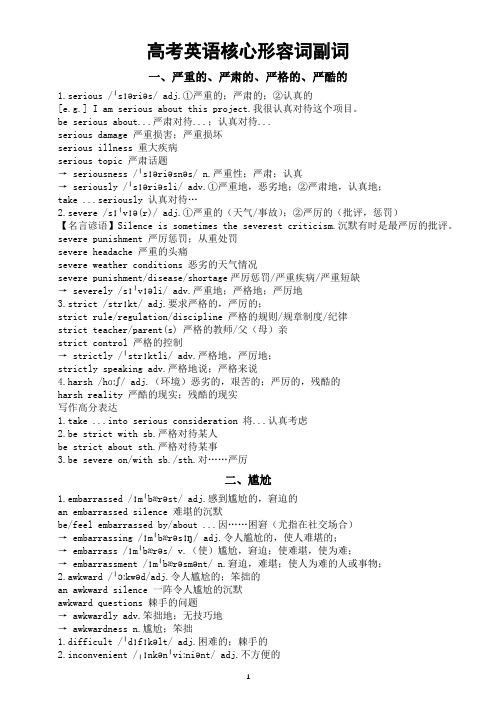
高考英语核心形容词副词一、严重的、严肃的、严格的、严酷的1.serious /ˈsɪəriəs/ adj.①严重的;严肃的;②认真的[e.g.] I am serious about this project.我很认真对待这个项目。
be serious about...严肃对待...;认真对待...serious damage 严重损害;严重损坏serious illness 重大疾病serious topic 严肃话题→ seriousness /ˈsɪəriəsnəs/ n.严重性;严肃;认真→ seriously /ˈsɪəriəsli/ adv.①严重地,恶劣地;②严肃地,认真地;take ...seriously 认真对待…2.severe /sɪˈvɪə(r)/ adj.①严重的(天气/事故);②严厉的(批评,惩罚)【名言谚语】Silence is sometimes the severest criticism.沉默有时是最严厉的批评。
severe punishment 严厉惩罚;从重处罚severe headache 严重的头痛severe weather conditions 恶劣的天气情况severe punishment/disease/shortage严厉惩罚/严重疾病/严重短缺→ severely /sɪˈvɪəli/ adv.严重地;严格地;严厉地3.strict /strɪkt/ adj.要求严格的,严厉的;strict rule/regulation/discipline 严格的规则/规章制度/纪律strict teacher/parent(s) 严格的教师/父(母)亲strict control 严格的控制→ strictly /ˈstrɪktli/ adv.严格地,严厉地;strictly speaking adv.严格地说;严格来说4.harsh /hɑːʃ/ adj.(环境)恶劣的,艰苦的;严厉的,残酷的harsh reality 严酷的现实;残酷的现实写作高分表达1.take ...into serious consideration 将...认真考虑2.be strict with sb.严格对待某人be strict about sth.严格对待某事3.be severe on/with sb./sth.对……严厉二、尴尬1.embarrassed /ɪmˈbærəst/ adj.感到尴尬的,窘迫的an embarrassed silence 难堪的沉默be/feel embarrassed by/about ...因……困窘(尤指在社交场合)→ embarrassing /ɪmˈbærəsɪŋ/ adj.令人尴尬的,使人难堪的;→ embarrass /ɪmˈbærəs/ v.(使)尴尬,窘迫;使难堪,使为难;→ embarrassment /ɪmˈbærəsmənt/ n.窘迫,难堪;使人为难的人或事物;2.awkward /ˈɔːkwəd/adj.令人尴尬的;笨拙的an awkward silence 一阵令人尴尬的沉默awkward questions 棘手的问题→ awkwardly adv.笨拙地;无技巧地→ awkwardness n.尴尬;笨拙1.difficult /ˈdɪfɪkəlt/ adj.困难的;棘手的2.inconvenient /ˌɪnkənˈviːniənt/ adj.不方便的3.clumsy /ˈklʌmzi/ adj.笨拙的4.ashamed /əˈʃeɪmd/ adj.尴尬的;羞愧的;羞耻的尴尬”的反义词fortable /ˈkʌmftəb(ə)l/ adj.舒适的2.convenient /kənˈviːniənt/ adj.方便的3.handy /ˈhændi/adj.便利的;灵巧的三、好奇1.curious /ˈkjʊəriəs/ adj.好奇的be curious about 对……感到好奇[e.g.]She was curious about the news.她对这个新闻感到好奇。
高考英语专项复习《形容词及副词》十年真题汇总含答案
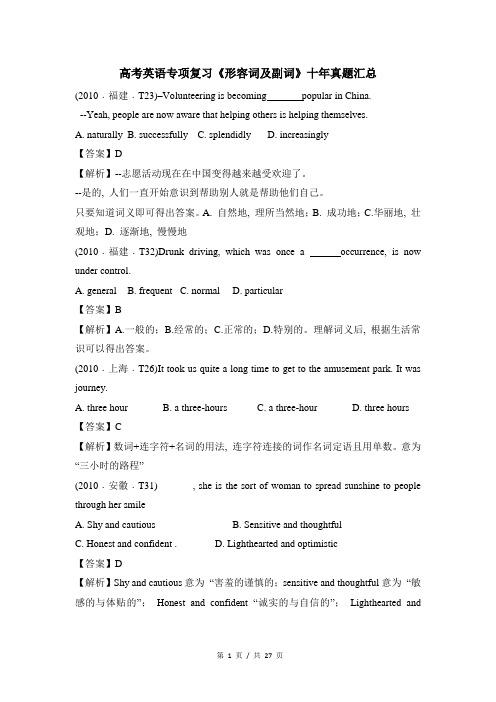
高考英语专项复习《形容词及副词》十年真题汇总(2010﹒福建﹒T23)–Volunteering is becoming popular in China.--Yeah, people are now aware that helping others is helping themselves.A. naturallyB. successfullyC. splendidlyD. increasingly【答案】D【解析】--志愿活动现在在中国变得越来越受欢迎了。
--是的, 人们一直开始意识到帮助别人就是帮助他们自己。
只要知道词义即可得出答案。
A. 自然地, 理所当然地;B. 成功地;C.华丽地, 壮观地;D. 逐渐地, 慢慢地(2010﹒福建﹒T32)Drunk driving, which was once a occurrence, is now under control.A. generalB. frequentC. normalD. particular【答案】B【解析】A.一般的;B.经常的;C.正常的;D.特别的。
理解词义后, 根据生活常识可以得出答案。
(2010﹒上海﹒T26)It took us quite a long time to get to the amusement park. It was journey.A. three hourB. a three-hoursC. a three-hourD. three hours 【答案】C【解析】数词+连字符+名词的用法, 连字符连接的词作名词定语且用单数。
意为“三小时的路程”(2010﹒安徽﹒T31)_______, she is the sort of woman to spread sunshine to people through her smileA. Shy and cautiousB. Sensitive and thoughtfulC. Honest and confident .D. Lighthearted and optimistic【答案】D【解析】Shy and cautious意为“害羞的谨慎的;sensitive and thoughtful意为“敏感的与体贴的”;Honest and confident “诚实的与自信的”;Lighthearted andoptimistic意为“愉快的与乐观的”。
高考英语复习核心形容词副词汇总讲义(生气困惑平静特别)

高考英语核心形容词和副词一、生气1.angry /ˈæŋɡri/ adj.生气的【反】delighted adj.高兴的;令人愉快的get angry 生气;发脾气be angry at/with sb./sth.生……的气[e.g.] I was really angry with her.我很生她的气。
[e.g.]There is no need being angry with others about the mistakes they unconsciously make.{应用文—建议信}没必要为别人无心犯下的错和他们生气。
make sb.angry 使某人生气[e.g.] It made me really angry.我很生气。
2.mad /mæd/ adj.生气的;发疯的like mad 疯狂地;极快地go mad 疯了be mad at/with sb.对某人生气[e.g.]You are not supposed to be mad at your sister.你不该对你妹妹生气。
be mad for sb./sth.为某人/某物着迷[e.g.]Tom is mad for basketball.汤姆对篮球十分着迷。
make/drive sb.mad 使人恼火[e.g.]Her silly questions drives me mad.她愚蠢的提问使我恼火。
【扩展】furious /ˈfjʊəriəs/ adj.生气的二、困惑1.puzzled /ˈpʌz(ə)ld/ adj.感到困惑的puzzled look 迷惑的表情be puzzled about/at/as to…对……感到困惑[e.g.]I have been puzzled as to why British people like to talk about weather.{应用文—书信}我一直很困惑为什么英国人喜欢谈论天气。
高考英语形容词与副词

无比较级,最高级的形容词和副词
1。表示比较,特殊意义的: comparative(ly),relative(ly),special(ly)
2。表绝对意义的unexpected(ly),entire(ly),excellent(ly),perfect(ly),total(ly),thorough(ly),whole(ly),complete(ly)
01
=be…rather than….=be rather…thaFra bibliotek….02
She was more frightened than hurt.
03
=She was less hurt than frightened.
04
=She was frightened rather than hurt.
05
4。形容词和副词的比较等级的用法:
比较等级的常见句型: 1)as+原级+as (as+adj.+a/an+单数名词+as) Tom can’t pay as high a price as I asked. It’s not so/as difficult as I expected.
2)比较级+than+比较对象(less+原级) He is taller than I/me. Mary is less clever than Tom.
5.比较状语中动词的使用: Bob looks younger than I do. Bob looks younger than he is. Bob looked younger than I did. I know you better than he does. I know you better than him.
高三英语语法总复习——形容词和副词
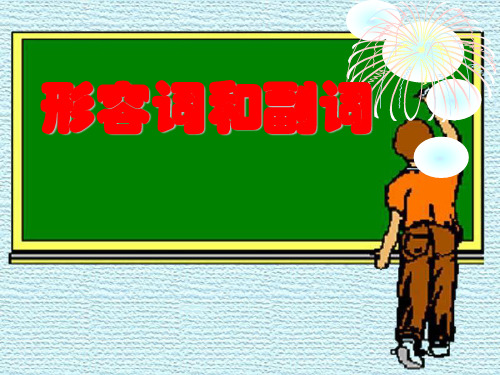
2)有些以-ly 结尾既为形容词,也为副词。 daily,weekly,monthly,yearly,early The Times is a daily paper. It is published daily.
1.There are some (dead )leaves on the ground. 地上有些枯叶。
2.The terrorist's attack caused more than three hundred (death).
恐怖分子的袭击造成了3百人的伤亡。
3.The roar of the explosion was followed by a (deathly) silence.
interesting because of its association with persons or events in history: 具有历史意义的首次太空旅行。而且也 用于形容那些因与历史事件或人物有联系而有名或有趣的事物:
a historic house. Historicalrefers to whatever
3. worthwhile 可作表语和定语 It is worthwhile to do或 It is worthwhile doing
dead --- deadly --- deathly
dead adj.死的, 无感觉的, 呆板的, 不流动的, (语言、习惯)废 弃了的, 熄灭的 n.死者 adv.完全地, 绝对的, 突然的 death n.死, 死亡, 致死的原因, 毁灭, 屠杀 deadly adj.致命的, 势不两立的, 死一般的, 极度的, 必定的 deathly adj.死一般的 adv.象死一样地
- 1、下载文档前请自行甄别文档内容的完整性,平台不提供额外的编辑、内容补充、找答案等附加服务。
- 2、"仅部分预览"的文档,不可在线预览部分如存在完整性等问题,可反馈申请退款(可完整预览的文档不适用该条件!)。
- 3、如文档侵犯您的权益,请联系客服反馈,我们会尽快为您处理(人工客服工作时间:9:00-18:30)。
① 这类形容词除afraid和ashamed可用very修饰 外, 一般不用very修饰, 可用其他表程度的副 词修饰, 如very much。常用搭配: wide awake 完全清醒 sound/fast asleep 酣睡 quite alone 非常孤独 still alive 仍然活着 much alike 非常相似
important
more important
most important
注意: 有些形容词的比较级和最高级可采用在词 尾加er和est的形式, 也可采用在单词前加 more和most的形式, 这类形容词有clear, common, cruel, free, handsome, lively, often, pleasant, polite, pretty, quiet, secure, solid, stupid等。
3. 某些描述感觉或心情的形容词: glad “高兴 的”; pleased “高兴的”; content “满意 的”; sorry “难过的”; upset “难过的”等。 如:
I am glad/pleased to hear that you are
offered a good job. 4. 其他表语形容词: certain “确认的”; sure
“确信的”; fond “喜欢的”; ready “准备好 的”; unable “不能……的”等。如:
I’m certain/sure that he will succeed.
三、复合形容词 1. 副词词干+分词, 如: hardworking 勤劳的 2. 名词词干+过去分词, 如: manmade人造的 3. 名词词干+现在分词, 如: timeconsuming 耗
词。如: backwards, northwards, sideways, crossways, clockwise等。
பைடு நூலகம்
2. 复合副词和短语副词 复合副词是指由两个词共同组成的副词。 如anyhow, meantime, nowhere, somehow, therefore等。 短语副词是指用连词把副词连接起来的短 语。如back and forth(前后), here and there(到处), now and then(不时)等。
高考复习形容词和副词
一、形容词作补语和状语 1. 形容词作主语补足语和宾语补足语时,
可以 表示“现状, 状态”; 也可以表示 某一动作的结果, 常用在表示“认为, 看待”等动词后, 如believe, prove, consider等。
2. 形容词作状语时, 可以看作是“being+形 容词”结构或when, if, because等从句的 省略, 表示时间、方式、原因、伴随、让 步、条件等, 也可以表示对主语进行解释, 说明主语是什么情况, 或进行强调, 其逻 辑主语必须与句子主语保持一致。如:
一、形容词和副词比较等级的构成 1. 形容词的比较级和最高级
单音节词和少数双音节词, 一般在词尾加er, est 来构成比较级和最高级。
构成法
单音节词和少数双音 节词一般在词尾加er, est
以不发音的e结尾的单 音节词只加r, st
原级 比较级 最高级
tall taller tallest cheap cheaper cheapest
come, seem, sound, appear, look, smell, taste, feel等。常见的表语形容词有: 1. 某些以a开头的形容词: afraid “害怕的”;
alive “活着的”; alone “单独的”; ashamed “羞愧的”; asleep “睡着的”; awake “醒着的”等。
9. 形容词词干+名词ed, 如: kindhearted 好心的
10. 形容词词干+现在分词, 如: ordinarylooking 相貌一般的
11. 形容词词干+形容词, 如: redhot 炽热 的
四、副词 1. 派生副词 1) 最常用的后缀是ly, 即“形容词+后缀ly”
构成副词。 2) 还有加后缀ward(s), ways, wise等构成副
Hungry and tired, he had to stop working. Ripe(=When they are ripe), the oranges
taste sweet.
二、表语形容词 表语形容词是一般只用于系动词后作表语 的形容词, 这类动词常见的有remain, stay,
stand, keep, lie, grow, turn, get, become, run,
nice nicer nicest large larger largest
以一个辅音字母结 尾的重读闭音节词, big 双写结尾的辅音字 thin 母, 再加er, est
bigger biggest thinner thinnest
以辅音字母加y结 尾的双音节词, 变y 为i, 再加er, est
full/well/quite aware of 充分意识到; 对……非常清醒 ② 表语形容词还可用作后置定语。如:
He is the most famous scientist alive in the
world today.
2. 某些与健康状况有关的形容词: well “健 康的”; fine “健康的”; poorly “不适; 不 舒服”; unwell “不舒服的”; ill “有病 的”; faint “头晕的”等。如: I’m feeling well today. He is ill today.
时的 4. 名词词干+形容词, 如: worldfamous 世界
闻名的 5. 数词词干+名词, 如: fivestar 五星级的 6. 数词词干+名词ed, 如: threelegged 三条腿
的
7. 数词词干+名词+形容词, 如: fiveyearold 5岁的
8. 形容词词干+过去分词, 如: readymade 现成的
busy angry
busier busiest angrier angriest
少数以er, ow结尾 的双音节词末尾加-
er, est
clever narrow
cleverer cleverest narrower narrowest
部分双音节词和多 音节词, 在其前加 more, most来构成 比较级和最高级
